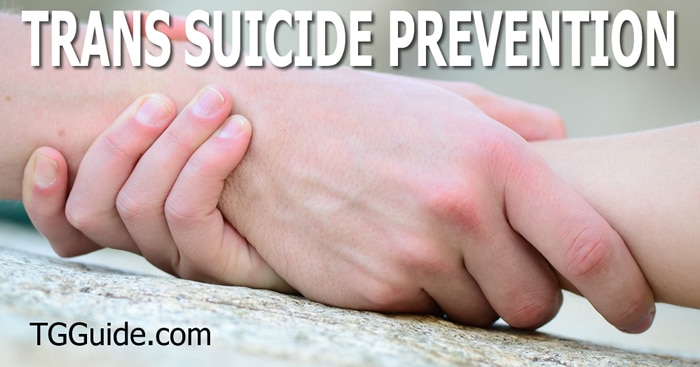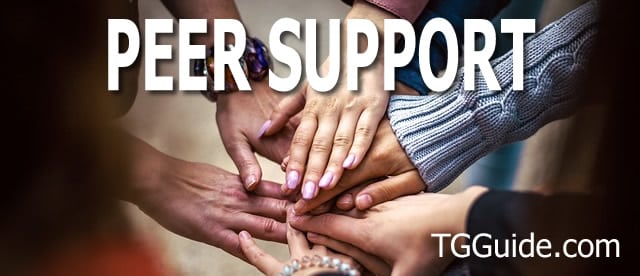Transgender Suicide Prevention
Transgender suicide prevention is a top priority within the trans community. Suicide and self-harm is a serious issue that has been receiving increasing attention in recent years but it is nothing new. Fortunately, we are now discussing the issue openly and many are taking steps to reduce the number of suicides among transgender and gender non-conforming people. The incidence of suicide among transgender individuals is alarmingly high, with studies showing that they are at a much higher risk for suicide compared to the general population.
You are Not Alone. Help is Available!
One study conducted by the American Foundation for Suicide Prevention and the Williams Institute found that 41% of transgender individuals have attempted suicide at some point in their lives. This is nearly nine times the rate of attempted suicide among the general population (4.6%).
Transgender Suicide Risk Factors
There are several reasons why transgender individuals may be at a higher risk for suicide. One major factor is the discrimination and marginalization that they often face in society. Many transgender people experience harassment, discrimination, and violence in their daily lives, which can lead to feelings of isolation and despair.
Additionally, transgender people often struggle with acceptance of their gender identity, which can lead to feelings of hopelessness and depression. They may even struggle with finding acceptance within the LGBTQ+ community, which can create further feelings of isolation.
Another significant factor is the lack of access to mental health services. Transgender individuals may face barriers to accessing mental health services, such as discrimination from healthcare providers or lack of insurance coverage for transgender-related healthcare.
A lack of acceptance and support from family and friends can also be a significant contributor to transgender suicide.
First Steps to Address Transgender Suicide
There are steps that can be taken to address transgender suicide and support transgender individuals. One important step is to increase awareness and understanding of the issue. This can be done by educating the public about the experiences of transgender individuals and the challenges they face.
Another step is to create a more inclusive and accepting society for transgender individuals. This can be done by working to change laws and policies that discriminate against transgender people, as well as by challenging attitudes and beliefs that contribute to discrimination.
It’s also important to provide better access to mental health services for transgender people. We must ensure that these services are both competent and sensitive to the unique needs of transgender people.
Family Support
Supporting a transgender family member can be a complex and challenging task, but it is also one of the most important ways to prevent suicide among transgender individuals. One of the most important things that a family can do to support their transgender family member is to provide acceptance and validation. This means acknowledging and affirming their gender identity, using their preferred name and pronouns, and supporting them in their gender expression.
It’s also important for families to educate themselves about the issues that transgender individuals face, such as discrimination and marginalization and to be aware of the signs of suicide. This can help families to identify when their transgender family member is struggling and to take appropriate action to support them.
Another important step that families can take is to advocate for their transgender family member. This means working to change laws and policies that discriminate against transgender people, as well as challenging attitudes and beliefs that contribute to discrimination.
Families can also support their transgender family member by providing access to mental health services. This means finding a therapist or counselor who is well-trained to understand and work with transgender people.
The family should be aware of risk factors, such as bullying and discrimination, and take steps to address them when they occur. It’s important for family members to create a safe and open space for their transgender family members to talk about their feelings and struggles. This can also be done by being active listeners, and being non-judgmental when they express their feelings.
Family support plays a crucial role in preventing suicide among transgender people.
Mental Health Support
Mental health professionals play a crucial role in supporting transgender individuals and reducing the incidence of suicide among this population.
One of the most important things that mental health professionals can do to support transgender individuals is to provide culturally competent and sensitive care. This means understanding the unique experiences and challenges that transgender individuals face and tailoring their treatment approach accordingly.
Mental health professionals can also support transgender individuals by providing validation and acceptance of their gender identity. This means using the correct pronouns, and being aware of the unique experiences and struggles that transgender individuals face.
Another important step is to help transgender individuals access appropriate medical care and hormone therapy. This can include working with a medical professional who is familiar with the needs of transgender individuals, and providing appropriate referrals and resources.
Mental health professionals should also be aware of and address the barriers that transgender individuals may face in accessing mental health care, such as discrimination and lack of insurance coverage.
It’s also important for mental health professionals to be aware of the signs of suicide and to take appropriate action when they occur. This can include providing crisis intervention and referring clients to appropriate resources.
Support Groups and Peer Support
Peer support, such as transgender support groups, can be an essential resource for supporting transgender individuals and reducing the incidence of suicide among this population.
Support groups provide a safe and non-judgmental space where transgender individuals can connect with others who understand their experiences and challenges. This can be especially important for transgender individuals who may feel isolated or unsupported in their communities.
Participating in a support group can also help transgender individuals to feel less alone and more understood, which can be an important factor in preventing suicide.
Support groups can also provide a sense of community and belonging, which can be an important protective factor against suicide.
Peer support groups can also provide practical resources and information, such as information on accessing healthcare, legal resources, and information on how to navigate social and work environments.
Additionally, support groups can also provide an opportunity for transgender individuals to build resilience and coping skills. This can include learning about self-care, setting healthy boundaries, and managing stress and anxiety.
Spot Suicidal Warning Signs
Spotting suicidal tendencies in a transgender person can be difficult, as the signs may be subtle or similar to those of other mental health conditions. However, it is important to be aware of the warning signs and to take appropriate action to support a transgender person who may be at risk of suicide.
One of the most common warning signs of suicide is a change in mood or behavior. This can include a noticeable increase in depression, anxiety, or irritability. Transgender people who are experiencing suicidal thoughts may also experience a loss of interest in activities they previously enjoyed, or a change in sleep and eating habits.
Another warning sign is verbal cues such as talking about feeling hopeless, helpless, or worthless. They may also express feelings of wanting to die, or a desire to end their life.
Physical signs of suicidal tendencies can include self-harm, such as cutting or burning, and changes in physical appearance, such as weight loss or neglecting personal grooming.
It’s important to remember that people who are suicidal may not always ask for help, so it’s important to be proactive in checking in on them and starting a conversation about how they’re feeling.
If you suspect a transgender person may be suicidal
If you suspect that a transgender person may be suicidal, the first step is to talk to them about your concerns. This can be done in a non-judgmental and supportive manner. It’s important to listen actively, and to be honest about your concerns.
It’s also important to provide the person with appropriate resources and referrals. This can include providing information about mental health services and suicide hotlines, as well as connecting them with support groups and other peer support resources.
Additionally, it’s important to be aware of the barriers that transgender people may face in accessing mental health services and to work towards removing those barriers.
It’s also important to remember that supporting a transgender person who is at risk of suicide is not a one-time event, but a long-term process. It’s important to check in with them regularly and to be there for them as they work through their struggles.
If You Feel Suicidal or Have Thoughts of Self-Harm
If a transgender person is feeling suicidal or experiencing thoughts of self-harm, it is important that they take immediate action to seek help and support.
First and foremost, it’s important to reach out to a trusted friend or family member and tell them about your feelings. Talking to someone about what you’re going through can provide a sense of relief and can be an important step towards getting the help you need.
It’s also important to contact a mental health professional or counselor. They can provide you with the support and guidance you need to work through your feelings and develop a plan to address your suicidal thoughts.
If you’re not ready to talk to someone you know, there are also several helplines and online resources available that can provide support. The National Suicide Prevention Lifeline (1-800-273-TALK) is a confidential helpline that is available 24/7. Additionally, the Trevor Project (1-866-488-7386) is a crisis helpline for LGBTQ+ youth.
It’s also important to take care of yourself physically. This can include getting enough sleep, eating well, and engaging in physical activity. Self-care can help to reduce stress and improve overall well-being.
It’s also important to make a safety plan. This can include identifying triggers contributing to suicidal thoughts or self-harm and developing strategies to address them. It also includes identifying people or places where you feel safe and can go for help when you need it.
It’s important to remember that seeking help is a sign of strength, not weakness, and that there is hope for recovery. With the right support and treatment, it is possible to work through suicidal thoughts and self-harm and to build a more positive and fulfilling life.
Suicide Prevention Resources
Remember that seeking help is a sign of strength, and there is hope for a happy life!
If a transgender person is experiencing a crisis and having suicidal thoughts, there are several resources available to help.
National Suicide Prevention Lifeline
One important resource in the U.S. is the National Suicide Prevention Lifeline by dialing the 988 Suicide and Crisis Hotline in the United States, 0r call 1-800-273-TALK. This confidential helpline is available 24/7 and is staffed by trained crisis counselors who can provide support, information, and referrals to local resources.
The Trevor Project
Another resource for transgender youth is The Trevor Project at 1-866-488-7386. They have trained counselors who are available 24/7 to provide support and counseling to individuals in crisis.
Trans Lifeline
Trans Lifeline (877-565-8860) is a peer support helpline staffed by transgender individuals, for transgender individuals. They are available to provide emotional support, information, and referrals to other resources.
LGBT Community Centers
Another resource is your local area LGBT Community Center, they may have support groups, counseling services and other resources specific to the local community. Locate these services by conducting a search in your favorite search engine. Search for terms such as “transgender support groups near me,” “transgender support groups in [add your location],” LGTB community center near me,” etc.
Transgender Friends and Caring Professionals
It’s also important to reach out to a trusted friend, family member, or healthcare provider. They can provide support and help connect you with appropriate resources.
It’s important to remember that seeking help is a sign of strength, not weakness, and that there is hope for recovery. With the right support and treatment, it is possible to work through suicidal thoughts and self-harm and to build a more positive and fulfilling life.
About the Author
Lori Wynn, Webmaster and Transgender Author
Lori Wynn (She/Her) is the webmaster of TGGuide. She is based in Portland, Oregon where she enjoys nature and the local LGBT scene. Lori is committed to providing useful information and resources for the transgender community. She is self-employed and devotes a great deal of her time to running this site along with several other transgender websites such as URNotAlone.com.
With her personal experience as a transwoman, she brings a personal and realistic perspective to her development of TGGuide.com. The provides personal networking opportunities such as live trans chat and the TGGuide transgender forum to allow friendships to be formed. The goal is that no transgender person will feel isolated. Other pages on the TGGuide site are created to provide access to resources and information such as transgender support groups, suicide prevention, trans ID changes, news articles, and a large library of helpful transgender articles with tips for a successful transgender experience.
Contact Lori Wynn: Lori@tgguide.com
Link to My Bio: Lori Wynn





